
The Asian hornet was first spotted in 2020 in Germany’s Heinsberg district, North Rhine-Westphalia. Since then, it has spread across much of Germany and has already been observed in Luxembourg.
German researchers have been tracking the hornet’s distribution. Sightings can be reported to the Naturschutzbund Deutschland (NABU). Their findings indicate that, relative to the local population, the hornet is most common in Saarland. In absolute numbers, around 60% of reported sightings come from North Rhine-Westphalia. The Rhineland and the Ruhr area are now heavily populated by the species.
By contrast, the Asian hornet remains virtually absent in Germany’s eastern states.
In Luxembourg, people can also report sightings of Asian hornets. The Luxembourg Beekeepers’ Association, together with the Nature Services (ANF) and the National Museum of Natural History, has set up a platform to collect these reports. Anyone who spots an Asian hornet or its nest can take a photo from a distance and send it to vespa@neobiota.lu or report it via the iNaturalist app.
It is advised not to approach the nest under any circumstances.
According to the platform, 427 observations have been recorded in the Grand Duchy so far. Since reporting began in March of last year, it appears that the Asian hornet is mainly concentrated in the southern and central regions of Luxembourg.
A single sting is usually comparable to that of a wasp, but the venom may be more painful and cause stronger local reactions. Experts recommend:
Seek immediate medical attention if you experience:
Asian hornet nests are often encountered high in trees or under roofs, but secondary nests can also be found in hedges or sheds. They may contain thousands of insects by late summer. Attempting to remove them without professional equipment is considered hazardous and represents a serious risk to personal safety.
In Luxembourg, the Nature and Forest Agency (ANF) coordinates nest removal. In Germany, state environment agencies and NABU advise contacting local authorities.
While Asian hornets are not generally aggressive towards people unless threatened, they pose a serious risk to honeybee populations and native insects. Beekeepers’ associations in both Luxembourg and Germany are closely monitoring their spread, with hundreds of reports in 2024 and 2025 concentrated in the south and west.
In the vicinity hornets may fly directly at you or hover in warning before attacking. If this happens, back away slowly without swatting.
Even if you encounter a nest that is not posing an immediate threat, residents are encouraged to report nests promptly to limit the hornet’s impact by maintaining a distance of at least 10-15 metres, taking a photograph (if safe to do so), and reporting as soon as possible.